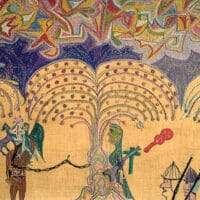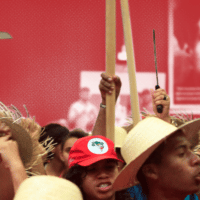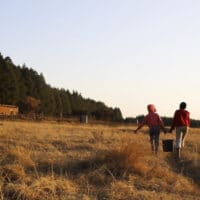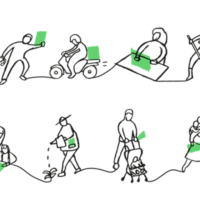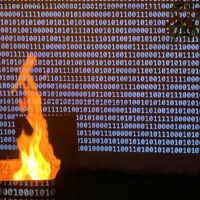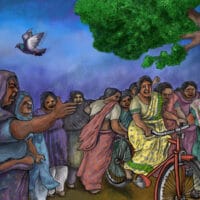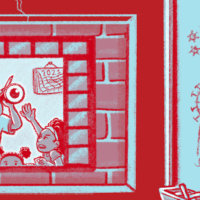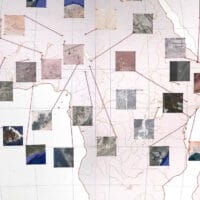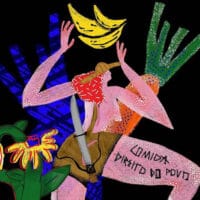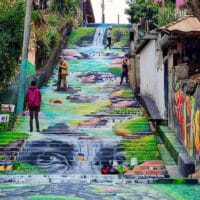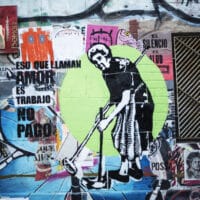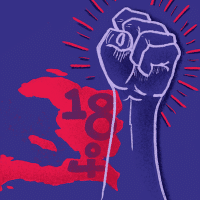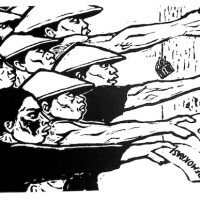-
Ten Theses on Marxism and Decolonisation
The Cuban Revolution came about in a country subordinated to the U.S. from all points of view. Although we had the façade of a republic, we were a perfect colony, exemplary in economic, commercial, diplomatic, and political terms, and almost in cultural terms.
-
Dossier no. 54: Gramsci in the midst of Brazil’s Landless Workers’ Movement (MST): an interview with MST Militante Neuri Rossetto
Despite the persistent hegemony of capitalism and its ruling neoliberal ideology, various forms of resistance, social struggle, and proposals for an emancipated future continue to emerge.
-
Dossier no. 53: This land is the land of our ancestors
The labour relations on South African farms continue to maintain race, gender, and class inequalities as a central character of work and life.
-
Go to Yan’an: culture and national liberation
The Chinese communist base area of Yan’an was a literal and metaphorical stage for envisioning, experimenting, and building a new society and a new human being.
-
Dossier no. 50: The military’s return to Brazilian politics
Brazil is in danger of becoming a country whose political economy is rooted in militarism, diverting precious social wealth to the military and police as it imposes a military ethic onto public life.
-
Dossier no. 49: A map of Latin America’s present: An interview with Héctor Béjar
Four emblematic coups have now been substantially reversed: Chile (1973), Peru (1992), Honduras (2009), and Bolivia (2019). Each of these coups was driven by political forces of the far right backed by the military and by the United States government.
-
Dossier no. 48: We will build the future: a plan to save the planet
The most scandalous fact of the current period is that 2.37 billion people are struggling to eat. Most of them are in developing countries, but many are in advanced industrial states.
-
Dossier No. 47: New clothes, old threads: the dangerous right-wing offensive in Latin America
The Western world lives in discontent. Progressive models have failed to maintain the levels of politicisation, mystique, capacity to question, transformative purpose, and possibilities of concrete changes for the masses.
-
Dossier No. 46: Big Tech and the current challenges facing the class struggle
We cannot give ourselves the luxury of being technophobic, of negating the importance of technologies and their potential in the struggle. At the same time, we cannot believe in the idea that technology in itself will result in advances for the organised working class.
-
Dossier No. 45: Indian women on an arduous road to equality
The current situation might present an opportunity to strengthen mass movements and to steer the focus towards the rights and livelihoods of women and workers. The ongoing Indian farmers’ movement, which started before the pandemic and continues to stay strong, offers the opportunity to steer the national discourse towards such an agenda.
-
Dossier 44: Black Community Programmes: The practical manifestation of Black Consciousness philosophy
Tricontinental: Institute for Social Research created the collages in this dossier based on archival photographs, inserting silhouettes of people and activities and breathing life back into the spaces of the Black Community Programmes of decades past.
-
Dossier No. 43: CoronaShock and education in Brazil: One and a half years later
One and a half years since the beginning of the pandemic in Brazil, it is possible to better evaluate some of its effects. The most visible immediate aspect of the pandemic has certainly been the sudden suspension of in-person activities and the temporary closure of schools and universities.
-
Dossier No. 42: Defending our sovereignty: U.S. military bases in Africa and the future of African unity
Neo-colonialism, Nkrumah noted, seeks to fragment Africa, weaken African state institutions, prevent African unity and sovereignty, and thereby insert its power to subordinate the aspirations of the continent for pan-African consolidation.
-
Dossier no. 41: The farmers’ revolt in India
India’s big capital, in close cahoots with the political class, took advantage of privatisation policies to seize public resources (including profitable public sector assets), acquire vast tracts of land by displacing village and forest communities, control the nation’s mineral resources, and undermine public sector banks through a cascading set of fraud and non-payment schemes.
-
Dossier no. 40: The challenges facing Brazil’s left
If the social consequences of adopting an ultra-neoliberal project weren’t enough already, the emergence of the coronavirus pandemic in 2020 and the gross mismanagement and negligence in combatting the virus have led to the worst-case social, economic, and health scenarios.
-
Dossier No. 39: Pity the Nation: Honduras is being eaten from within and without
On 28 June 2009, President Manuel Zelaya was overthrown in a coup d’état engineered by the Honduran oligarchy and the United States government. The reverberations of the coup extend into present-day Honduras, which continues to struggle to maintain its political sovereignty.
-
Dossier No. 38: Uncovering the crisis: Care work in the time of Coronavirus
The pandemic has sharpened and transformed pre-existing inequalities, reconfiguring the processes that sustain and guarantee life.
-
Dawn: Marxism and National Liberation
Only at the end of his life did Karl Marx leave the shores of Europe and travel to a country under colonial dominion. This was when he went to Algeria in 1882. ‘For Mussulmans, there is no such thing as subordination’, Marx wrote to his daughter Laura Lafargue.
-
Dossier no. 36: Twilight: The erosion of U.S. control and the multipolar future
If there was one revolution that marked the beginning of the end of the colonial epoch and that inaugurated a new worker-led civilisation, it was the Haitian Revolution of 1804. Enslaved Africans defeated the four major European powers of the day, won their freedom, and declared an independent republic.
-
Dossier 35: The Legacy of Lekra: Organising revolutionary culture in Indonesia
Martin Aleida recalls the moment he was released from prison at the end of 1966. At twenty-two, Martin emerged from nearly a year behind bars to Jakarta, unable to find his friends and comrades.

